
Governors have declared states of emergencies from Louisiana to New Jersey due to a massive snow and ice storm. A National Weather Service memo calls the storm “an event of historical proportions,” identifying it as “catastrophic … crippling … paralyzing … choose your adjective.” The storm has already caused at least 13 deaths and left 550,000 without power. We speak to Jeff Masters, director of meteorology at the Weather Underground.
Transcript
JUAN GONZÁLEZ: Governors have declared states of emergencies from Louisiana to New Jersey due to a massive snow and ice storm. A National Weather Service memo issued Wednesday called the storm “an event of historical proportions,” identifying it as, quote, “catastrophic … crippling … paralyzing … choose your adjective.” The storm has already been blamed for at least 13 deaths. Meanwhile, 550,000 people have lost power in the Southeast due to the ice storm, more than a third of them in Georgia where highways across the state are closed because of icing and downed power lines. Federal offices have been closed in Washington, D.C.
AMY GOODMAN: For more, we go to Jeff Masters, director of meteorology at the Weather Underground. He’s joining us by Democracy Now! video stream from Ann Arbor, Michigan.
Jeff, give us a lay of the land right now throughout the East Coast of the United States.
JEFF MASTERS: Yeah, this storm is bringing snowfall rates as high as three inches per hour right now to the Philadelphia area. It’s an inch an hour in New York City. They’ve already had a foot of snow in Baltimore. And then, back over Georgia and South Carolina, up to about a half-inch of freezing rain and ice, which caused all those power outages.
JUAN GONZÁLEZ: And this is one huge storm across the eastern part of the United States now, or is it several weather patterns?
JEFF MASTERS: No, it’s just one big nor’easter. You’re getting strong northeast winds blowing that snow around, and you’re going to get a lot of power outages in the Northeast today.
AMY GOODMAN: And explain the significance of this, its historic nature, particularly in the South, paralyzing places like South Carolina.
JEFF MASTERS: Yeah, it’s not often you get a half-inch of ice in South Carolina and Georgia. The last time they saw an ice storm like this was back in the year 2000, when again we had about a half a million people lose power in an ice storm. Ten inches of snow in Alabama from this storm—you don’t see 10 inches of snow there very often.
JUAN GONZÁLEZ: And how do you compare this storm and the many snowstorms we’ve had already, while in the West they’re still continuing massive drought?
JEFF MASTERS: Yeah, the remarkable thing about this storm is it occurs at the tail end of a very long period of intense winter that we’ve seen over the eastern U.S., but at the same time, the western U.S. has been struggling with record drought and all-time high temperatures in January. So, the weather has been in kind of this schizoid mode, where it’s unusually cold over the eastern half of the U.S. and unusually warm over the western half.
AMY GOODMAN: What’s causing this, Jeff, since it’s one major ice storm?
JEFF MASTERS: Yeah, you can always look at the jet stream to try and look at what our weather is doing. The jet stream acts as the boundary between warm air to the south and cold air to the north. And right now that jet is very far to the south over the southeast U.S., which allows a lot of cold air to spill southwards out of Canada and create the cold conditions we need to form this kind of an ice storm and snowstorm.
AMY GOODMAN: You’ve written that if Philadelphia International Airport receives six inches or more of snow from this system, it would be the first time since record keeping began during the winter of 1884 to ’85 that Philadelphia has had four separate six-inch or greater snowstorms in the winter. Talk about what the trend—and can you relate—you know, so often the climate change deniers mock anyone who connects this kind of freezing weather with global warming. But what kind of links would you make?
JEFF MASTERS: Yeah, we have to understand that climate change is affecting all weather patterns, regardless of the season. Yes, winter still occurs. But we do expect climate change to affect jet stream patterns in winter storms. Now, in particular, this kind of very unusual jet stream pattern that’s been so persistent is something that could arise out of climate change. We don’t often see the jet stream lock into place like this and not budge for a period of months. And we make that more likely—is one research avenue being explored now—if we remove a lot of sea ice in the Arctic, warming up the Arctic more than the rest of the planet. That can have impacts on the jet stream, causing it to slow down and to not move quite as quickly, and lock in place for these extended periods like we’ve seen.
AMY GOODMAN: Well, Jeff, we want to thank you for being with us, director of meteorology at Weather Underground. When we come back from break, we’re going to go to Vermont, another place that is going to see a lot of snow, to Middlebury, Vermont, to speak with Bill McKibben, director of 350.org, author of Oil and Honey. And then we head to North Carolina, which has seen the greatest coal ash spill, one of the largest in history. Stay with us.

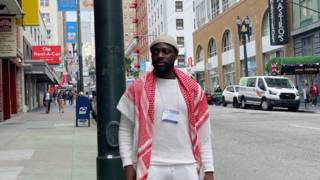
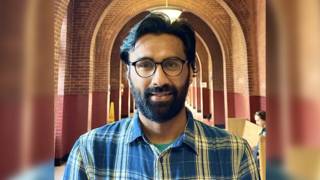
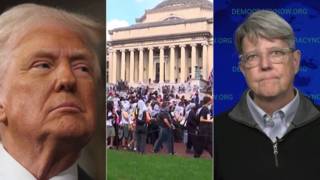
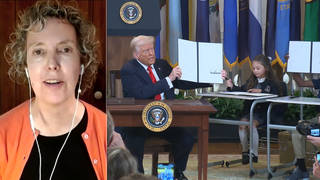





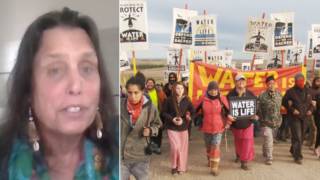

Media Options